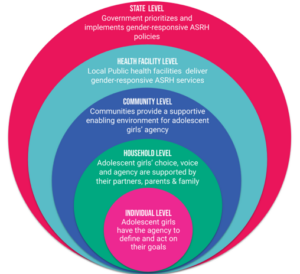Habiba hates gossip — it’s called umbeya in Swahili.
She’s 21 and she doesn’t have many girlfriends except her younger sister.
“If you tell a girlfriend anything, she’ll tease you and tell everyone else.”
Habiba has a lot on her plate. She lives with her mother, two sisters and brother and helps the family get by selling porridge on the street in her Tandika neighborhood.
In five years, she wants something more for herself. What, she doesn’t know. “Anything except owning a salon. I’m not good at doing hair. That’s why I’ve cut all mine off.”
She’s here at the Adolescents 360 Pop Up Workshop because a peer in her neighborhood invited her. Her peer, Mariam is sitting beside her and winces slightly when Habiba disparages her relationships with girls her age.
Habiba adds, “I came to learn about contraception myself and so I can share the right information with my younger sister.”
This Saturday, the roving workshop popped up a short distance from Habiba’s house. Underneath a tent — covered in youthful posters and fabrics — she jumps in by learning how to make earrings.
Then, after an hour or so, Habiba visits with a PSI-trained health provider who is patiently waiting in an area behind the tent to talk privately and discreetly about pregnancy prevention with any girl when and if they want.
On this day, 76 teenage girls visited the pop up. 30 of them chose a contraception method and an additional 17 got counseling.
Before she heads in, Habiba finds me and says, “Getting contraception is important. But I also don’t know what I want to do for a business. I’m no longer in school.”
Habiba stresses that she wants more concrete skills. She wants to learn about business and how to make something more of herself.
She’s not alone. Many girls have asked the Adolescents 360 program for stronger business skills.
Because the program is iterative and based on getting feedback from the teens, the A360 team has started building partnerships with other NGOs that specialize in teaching skill development for decent jobs in growth sectors. The team in Tanzania is working with BRAC, an international organization that has been working in Tanzania for over a decade providing programs in microfinance, small enterprise development and livelihood for adolescents.
The goal is to provide turnkey service — contraception and livelihood skills — at one easy entry point.
With advice and guidance from girls like Habiba, the program will only become stronger and more effective.
Adolescents 360 (A360) is a four-and-a-half year initiative co-funded by the Bill & Melinda Gates Foundation and the Children’s Investment Fund Foundation (CIFF). The project is led by Population Services International (PSI) together with IDEO.org, University of California at Berkeley Center on the Developing Adolescent, the Society for Family Health Nigeria, and Triggerise. The project is being delivered in Ethiopia, Nigeria and Tanzania, in partnership with local governments, local organizations, and local technology and marketing firms. In Tanzania, A360 is building on an investment and talent from philanthropist and design thinker Pam Scott.



